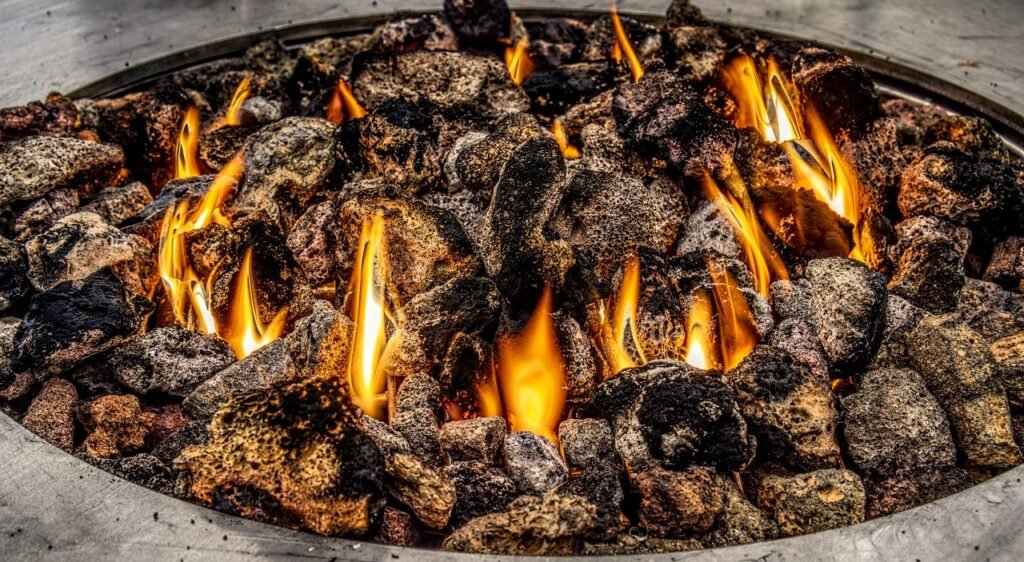When it comes to staying cozy and warm during those chilly winter nights, having a fireplace heater can be a game-changer. But with the multitude of options available, it can be overwhelming to choose the right one for your home. That’s why we’ve deciphered the technology behind electric and gas fireplace heaters, so you can confidently make the perfect choice. Whether you’re looking for convenience, efficiency, or ambiance, this article will guide you through the pros and cons of electric and gas fireplace heaters, helping you create the perfect atmosphere for relaxation and comfort. So sit back, relax, and let’s explore the world of fireplace heater tech together.
Cost
Initial cost
When it comes to the initial cost, electric fireplace heaters are generally more affordable compared to gas fireplace heaters. Electric units can range in price from $100 to $1000, depending on the features and design. On the other hand, gas fireplace heaters tend to have a higher initial cost, ranging from $500 to $5000, considering the necessary gas line installation and venting requirements.
Installation cost
Installing an electric fireplace heater is usually inexpensive and straightforward. Most models simply require plugging them into a standard electrical outlet. On the other hand, gas fireplace heaters may require professional installation, including the installation of a gas line and proper ventilation, which can lead to higher installation costs.
Operating cost
When it comes to the operating cost, electric fireplace heaters are generally more energy-efficient than gas fireplace heaters. Electric heaters typically run on standard household electricity and consume around 1.5 to 1.6 kilowatts per hour. On the other hand, gas fireplace heaters rely on natural gas or propane, which can fluctuate in price depending on the market. Natural gas heaters generally cost less to operate compared to propane ones.
Maintenance cost
Maintenance costs for both electric and gas fireplace heaters are relatively low. Electric fireplace heaters require minimal maintenance, usually limited to occasional dusting and replacing the light bulbs or heating elements if they burn out. Gas fireplace heaters, on the other hand, might require more regular maintenance, including inspecting and cleaning the venting system, checking for gas leaks, and servicing the burner. Overall, gas fireplace heaters might have slightly higher maintenance costs due to the need for periodic professional inspections.
Efficiency
Heat output efficiency
Electric fireplace heaters are highly efficient when it comes to heat output. They convert most of the electricity they consume into heat, allowing you to efficiently warm up your space. In contrast, gas fireplace heaters can have varying heat output efficiency depending on their design and efficiency rating.
Energy efficiency
Electric fireplace heaters are generally more energy-efficient compared to gas fireplace heaters. Electric heaters do not require energy conversion from one form to another, resulting in less energy loss. Additionally, electric heaters do not produce any byproducts (such as carbon monoxide), making them a safer and greener option. Gas fireplace heaters, however, are still a viable option for those seeking a cozy ambiance and the charm of a real flame.
Heating coverage
Both electric and gas fireplace heaters can offer sufficient heating coverage. Electric units typically heat smaller spaces, such as individual rooms or cozy corners, while gas heaters can provide warmth to larger areas, such as living rooms or even multiple connected spaces.

This image is property of pixabay.com.
Convenience
Ease of installation
Electric fireplace heaters are incredibly easy to install. Some models come as freestanding units that simply need to be plugged in, while others can be wall-mounted with minimal effort. Gas fireplace heaters, on the other hand, require professional installation for gas line connection, proper venting, and safety measures. This installation process can be more time-consuming and may involve coordination with contractors.
Ease of use
Both electric and gas fireplace heaters are designed to be user-friendly. Electric heaters often come with remote controls, allowing you to adjust the heat settings and flame intensity with ease. Gas fireplace heaters typically have manual controls, but newer models may also offer remote control options for added convenience.
Control options
Electric fireplace heaters offer a wide range of control options. You can easily adjust the heat output, flame intensity, and even the color of the flames in some models. Gas fireplace heaters also provide control over the flame height and heat output, but the range of customization might be more limited compared to electric units.
Safety
Ventilation requirements
Electric fireplace heaters do not require any specific ventilation since they do not produce any fumes or emit combustion byproducts. On the other hand, gas fireplace heaters require proper ventilation to ensure the safe release of combustion byproducts, such as carbon monoxide. This ventilation includes the installation of a venting system that leads the exhaust gases outside.
Risk of gas leaks
While gas fireplace heaters come with the risk of gas leaks, modern models are designed with safety features to minimize this risk. It is crucial to have gas heaters installed and maintained by professionals to ensure proper connection and functioning. Regular inspections and carbon monoxide detectors should also be in place to provide an added layer of safety.
Risk of electrical hazards
Electric fireplace heaters generally have a lower risk of electrical hazards compared to gas units. However, it is essential to follow the manufacturer’s instructions, avoid using extension cords, and ensure the electrical outlets are in good condition. Proper maintenance and periodic inspections are recommended to prevent any potential electrical issues.

This image is property of pixabay.com.
Aesthetics
Flame realism
When it comes to flame realism, gas fireplace heaters often provide a more authentic and natural-looking flame compared to electric units. Gas flames typically have a flickering effect, mimicking the appearance of real wood-burning fireplaces. Electric fireplace heaters have made significant advancements in flame simulation technology and can offer realistic flame effects, including adjustable intensity and even ember effects in higher-end models.
Variety of designs
Both electric and gas fireplace heaters come in a wide range of designs and styles to suit different preferences. Electric units offer versatility in terms of design, ranging from traditional mantel-style fireplaces to sleek wall-mounted or insert options. Gas fireplaces are available in various designs, including traditional open hearth fireplaces, contemporary linear fireplaces, and even realistic gas log inserts.
Ambiance enhancement
Both electric and gas fireplace heaters can enhance the ambiance of any space. The dancing flames and gentle crackling sounds create a cozy and inviting atmosphere. The glow and warmth of a fireplace can add a touch of romance, relaxation, and comfort to your home, making it a perfect focal point in any room.
Environmental Impact
Carbon emissions
Electric fireplace heaters have a minimal carbon footprint since they do not burn any fuel and do not emit any pollution. On the other hand, gas fireplace heaters release combustion byproducts, including carbon dioxide, into the atmosphere. However, manufacturers continue to improve the efficiency of gas fireplace heaters, reducing their environmental impact.
Natural gas usage
Gas fireplace heaters rely on natural gas or propane, both of which are fossil fuels. The usage of natural gas contributes to the depletion of non-renewable resources. However, advancements in gas burner technology have made gas fireplace heaters more efficient, reducing the amount of gas consumed.
Electricity consumption
Electric fireplace heaters consume electricity to generate heat and simulate flames. The electricity consumption varies depending on the model, but overall, electric units are considered energy-efficient. It is worth noting that the electricity used to power electric heaters can still have an environmental impact depending on the energy source in your region, such as coal or renewable energy.

This image is property of pixabay.com.
Heat Output
Instant warmth
Electric fireplace heaters offer instant warmth as soon as they are turned on. The heating elements generate heat within seconds, quickly warming up the surrounding area. Gas fireplace heaters also provide instant heat, as the flames and gas burners immediately produce warmth upon ignition.
Zonal heating
Electric fireplace heaters are capable of zonal heating, meaning they can efficiently heat a specific area or room. This allows you to target the heat to the areas you need it most, which can help save energy by reducing the need to heat the entire house. Gas fireplace heaters can also provide zonal heating if they are properly sized and their heat output is controllable.
Ability to heat larger spaces
Gas fireplace heaters are typically more suitable for heating larger spaces, such as open-concept living rooms or multiple connected areas. The heat output and coverage of gas units are generally higher, allowing for effective warming of larger areas. Electric fireplace heaters are better suited for smaller spaces or as supplemental heating sources in larger rooms.
Installation Flexibility
Existing gas connections
Gas fireplace heaters require an existing gas connection or the installation of a new gas line, which can limit their installation flexibility. It is essential to consider the availability and feasibility of gas connections in your home before opting for a gas fireplace heater. On the other hand, electric fireplace heaters do not have any specific installation requirements and can be easily installed as long as there is access to a standard electrical outlet.
Electrical accessibility
Electric fireplace heaters only need access to a standard electrical outlet, making it convenient to install them in various locations throughout your home. Nearly all homes have electrical outlets, making electric units highly accessible. Gas fireplace heaters, on the other hand, require professional installation due to the need for a gas line connection, limiting their placement options.
Venting options
Electric fireplace heaters do not require any venting since they do not produce any combustion byproducts. This lack of venting requirement offers flexibility in terms of installation, as electric units can be easily placed in any desired location. Gas fireplace heaters, on the other hand, require proper venting to ensure the safe release of exhaust gases. This venting requirement can limit the placement options and add complexity to the installation process.
Maintenance
Cleaning requirements
Both electric and gas fireplace heaters have relatively low cleaning requirements. Electric units typically require occasional dusting and cleaning of the glass panel or screen. Gas fireplace heaters might require more regular cleaning, including the removal of dust, debris, or soot from the firebox, burner, and log set. It is essential to follow the manufacturer’s instructions regarding cleaning and maintenance to ensure the efficient and safe operation of the unit.
Component replacement
Over time, certain components of both electric and gas fireplace heaters may require replacement. Electric units might need bulb or heating element replacements if they burn out. Gas fireplace heaters might require periodic replacement of the burner, gas logs, or other components to maintain their performance and appearance. Regular maintenance and inspection can help identify any potential issues and ensure the longevity of the unit.
Health Considerations
Air quality impact
Electric fireplace heaters do not produce any emissions or combustion byproducts, making them a safer option for air quality. They do not generate smoke, soot, or fumes that can negatively affect indoor air quality. On the other hand, gas fireplace heaters, although designed with proper ventilation, produce combustion byproducts, such as carbon monoxide. Proper ventilation and regular inspections are crucial to mitigate any potential health risks associated with gas heaters.
Humidity levels
Electric fireplace heaters do not affect humidity levels significantly since they do not produce moisture or remove moisture from the air. Gas fireplace heaters can contribute to a slight decrease in humidity due to the combustion process. This decrease in humidity can be beneficial in certain regions or during colder months when indoor air tends to be drier, but it is important to monitor and maintain appropriate humidity levels for optimal comfort and health.
In summary, when choosing between electric and gas fireplace heaters, various factors must be considered. Electric units generally have a lower initial cost, easier installation, lower operating costs, and higher energy efficiency. They also offer a wide range of designs and a more convenient user experience. On the other hand, gas fireplace heaters provide a more authentic flame realism, have greater heating coverage, and can be more suitable for larger spaces. Both options have different implications for safety, aesthetics, environmental impact, heat output, installation flexibility, and maintenance requirements. By carefully evaluating your specific needs and preferences, you can make an informed decision that suits your lifestyle and enhances the comfort and ambiance of your home.




